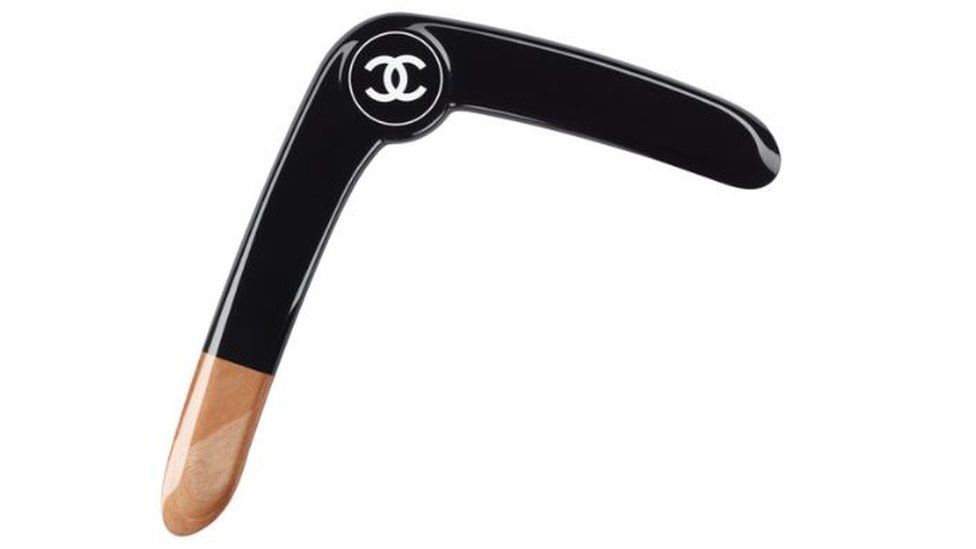Ridicule and condemnation for Chanel's $1,500 boomerang
- Published

You've done your shopping but there's just one thing missing, the thing you absolutely don't need but somehow still want to set yourself apart?
Look no further. French luxury brand Chanel has your back: a boomerang for $1,460 (€1,260; £1,130). A hefty price tag.
Surely it must be designed by a famous indigenous artist. Sadly, no.
The indigenous community in Australia says this is yet another example of crass cultural appropriation.
The item is listed on Chanel's website under Other Accessories in the 2017 Spring-Summer pre-collection, along with other gadgets like a pair of beach rackets with balls for £2,860.
Spending a little extra to give you that air of luxury should of course not come as a surprise when it comes to brands in the league of Chanel.
It's the name you pay for and the perceived status that comes with it and Chanel will likely not be bothered about having that pointed out to them.
But accusations of offending or even humiliating an entire indigenous culture are a different ball game and the French luxury brand certainly is feeling some heat.
"It's simply a misappropriation of aboriginal culture," Gabrielle Sullivan, chief executive of the Indigenous Arts Code, tells the BBC.
Her organisation has been lobbying against imported and mass produced fake aboriginal artefacts for years.
In February, Ms Sullivan spoke to the BBC about the problem of cheap fake imports
"Chanel is a big company and they really should know better. I don't see how this is different from a cheap fake boomerang sold at the airport. It's just an expensive version of this."
A cultural symbol
Boomerangs have traditionally been used by Australia's indigenous people as a hunting weapon.
But they are more than that, explains aboriginal artist Bibi Barba. They carry significant cultural attachments, are used to pass culture and tradition from one generation to the next.
"They are a cultural symbol for us," she tells the BBC. "A lot of indigenous artists do artwork on them and this artwork is different in different parts of the country, it holds different meaning."
But it's not just the artwork on the boomerangs that carries cultural signifiers and tradition - even things like the selection process for the wood is of crucial importance.
Boomerangs are still made by artists in the indigenous community and are popular tourist souvenirs in the country. But most of the boomerangs that tourists carry back home are not made by local communities but mass produced - in many cases not even in Australia.
The Indigenous Arts Code launched a campaign earlier this year to ban imported fake artefacts made in China or Indonesia.
The whole point, Ms Sullivan explains, is that "mass-production is taking away the potential for aboriginal people and artists to sell authentic products."
The lack of cultural sensitivity combined with the hefty price tag is a perfect set-up for cynicism and ridicule.
So what should Chanel do? The backlash on social media in the past two days since the boomerang appeared on their website has already sparked a first reaction.
"Chanel is extremely committed to respecting all cultures, and regrets that some may have felt offended," the French company said in a statement circulating in Australia's local media.
The luxury copycat
But just being sorry might not cut it. The countless comments range from witty jokes to straight-forward criticism, calls for apologies but also demand for compensation.
It's a demand that artist Bibi Barba couldn't agree more with.
"They should donate the money they make with this to the campaign against fake culture so we can lobby the government to do something about this problem," she says.
"This current case gets a lot of attention because it's Chanel. But it happens on a huge scale and it happens all the time. Not just with boomerangs but with paintings, didgeridoos and other things."
And she points out the irony of the bigger picture.
"Chanel and other luxury fashion brands hate it when people steal their logos and make copies of their products."
"So it would be a good point for them to make amends."
- Published15 February 2017
- Published14 February 2017